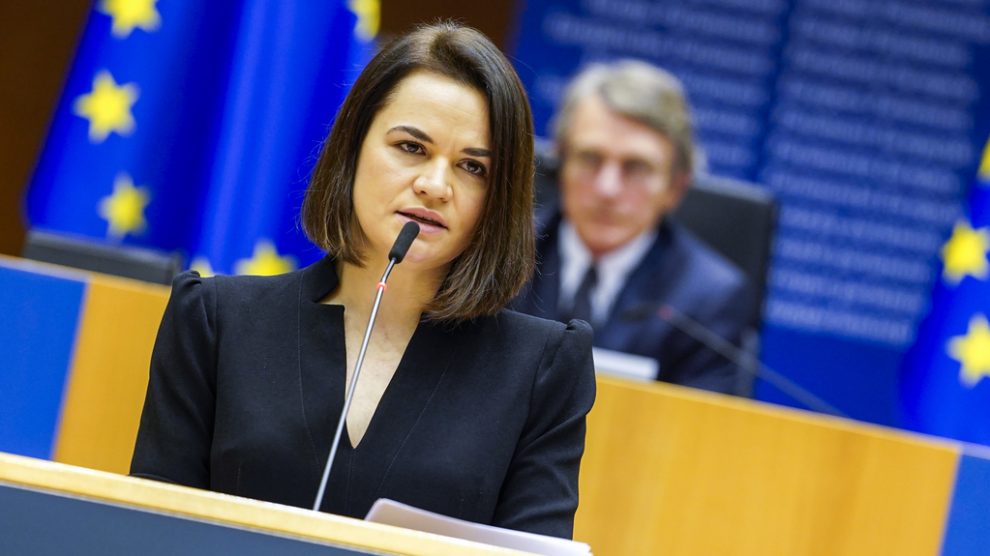If the European Union wants to match its words about bringing democracy and the rule of law to Belarus with action, then the country must be represented at its Eastern Partnership summit, scheduled for December 15.
Rarely has the European Union’s Eastern Partnership programme faced as stiff a test as that with which it is currently confronted, just a couple of weeks ahead of a flagship summit.
- NATO warns Russia that invading Ukraine would be a costly mistake
- ‘They didn’t think a housewife would unite people’, says Belarus opposition leader Tikhanovskaya
- Poland warns of ‘armed’ escalation as Belarus border crisis intensifies
The Eastern Partnership was launched in 2009 with the aim of strengthening and deepening both political and economic relations between the EU, its member states, and six Eastern European and South Caucasus partner countries (Armenia, Azerbaijan, Belarus, Georgia, Moldova, and Ukraine).
In June, however, Belarus pulled out, claiming that the EU’s economic sanctions made it “impossible” for the country to fulfil its obligations.
Since October 2020, the EU has progressively imposed restrictive measures against Belarus. The measures were adopted in response to the fraudulent nature of an August 2020 presidential election, and the intimidation and violent repression of peaceful protesters, opposition members and journalists.
The EU has not recognised the results of the election, condemning them as neither free, nor fair.
A seat at the table
Nevertheless, just days after Alexander Lukashenko pulled Belarus out of the Eastern Partnership, the EU outlined a proposal on how to push forward cooperation with all of its eastern partners – including Minsk.
The proposal is based on five long-term objectives, with resilience at its core, and will be underpinned by a 2.3 billion euros economic and investment plan in grants and guarantees, with a potential to mobilise up to 17 billion euros in public and private investments.
The comprehensive proposal aims at increasing trade, growth and jobs, investing in connectivity, strengthening democratic institutions and the rule of law, supporting the green and digital transitions, and promoting fair, gender-equal and inclusive societies.
The proposal will form the basis of discussions around future Eastern Partnership policy ahead of the upcoming summit, set to take place in Brussels on December 15.
Launching the new proposal, the EU’s foreign policy chief, Josep Borrell said: “The Eastern Partnership remains high on the European Union’s agenda. We want to shape an agenda that responds to the unprecedented challenges – and opportunities – of today, while making it fit for the future. At the heart of our work will be promoting democracy, good governance and the rule of law, which are so crucial to unlock positive, concrete results in our cooperation. This includes Belarus, where we want to continue to support the people through our Eastern Partnership framework.”
But if Belarus does not have a seat at the summit table, it is difficult to see how Borrell’s words can be put into practice. For this reason there is increasing pressure on the EU to invite the leader of the Belarus democratic opposition, Svetlana Tikhanovskaya, to Brussels as the country’s official representative. During a debate on Belarus in the European Parliament in October, several MEPs called for Tikhanovskaya to take Belarus’ seat at the summit.
Doing so would have political implications that go beyond the summit and the Eastern Partnership, however: it would be a de facto recognition of Tikhanovskaya, who by any objective measure defeated Lukashenko in the 2020 presidential election, as Belarus’ head of state.
A member of Tikhanovskaya’s team has confirmed to Emerging Europe that they are currently “figuring out” how the exiled leader can participate “on behalf of the Belarusian people” but that nothing had yet been confirmed.
Matching words with action
There is clearly a great deal of fear in Brussels over how Lukashenko would react: he has in recent weeks threatened to shut off energy transit from Russia to the EU through Belarus should the bloc apply new sanctions over the influx of migrants on the country’s western border, although Russian President Vladimir Putin immediately warned him that such action would be “a violation of our transit contract”. Undeterred, Lukashenko repeated the threat on November 30.
Since August, thousands of people, mainly from Syria, Iraq, and Yemen, have traveled to the Belarusian capital of Minsk, through Middle East-based holiday tour operators making false claims of easy EU entry.
Although some migrants have been repatriated over the past few days, thousands of people remain stuck in harsh conditions on the Belarusian-Polish frontier amid the standoff between Minsk and the EU, which accuses Belarus of deliberately orchestrating the crisis.
The European Union is this week set to adopt a fifth package of sanctions against Belarus that will add 17 people and 12 entities as the bloc targets those involved in what it alleges is Minsk’s orchestration of the migrant crisis.
But while Tikhanovskaya has herself admitted that sanctions work, it is equally important, she believes, that the EU offers more support to the Belarusian opposition.
“It’s high time to show solidarity and assist those who are fighting for democratic change,” she told Emerging Europe in September. “A combination of pressure on the one hand and assistance for civil society on the other is what will help release political prisoners and bring about a new Belarus through free, and fair, elections.”
A seat at the Eastern Partnership summit table would be the clearest signal yet that the EU is prepared to match its words with action.
Photo: © Daina Le Lardic / European Parliament.
Unlike many news and information platforms, Emerging Europe is free to read, and always will be. There is no paywall here. We are independent, not affiliated with nor representing any political party or business organisation. We want the very best for emerging Europe, nothing more, nothing less. Your support will help us continue to spread the word about this amazing region.
You can contribute here. Thank you.


